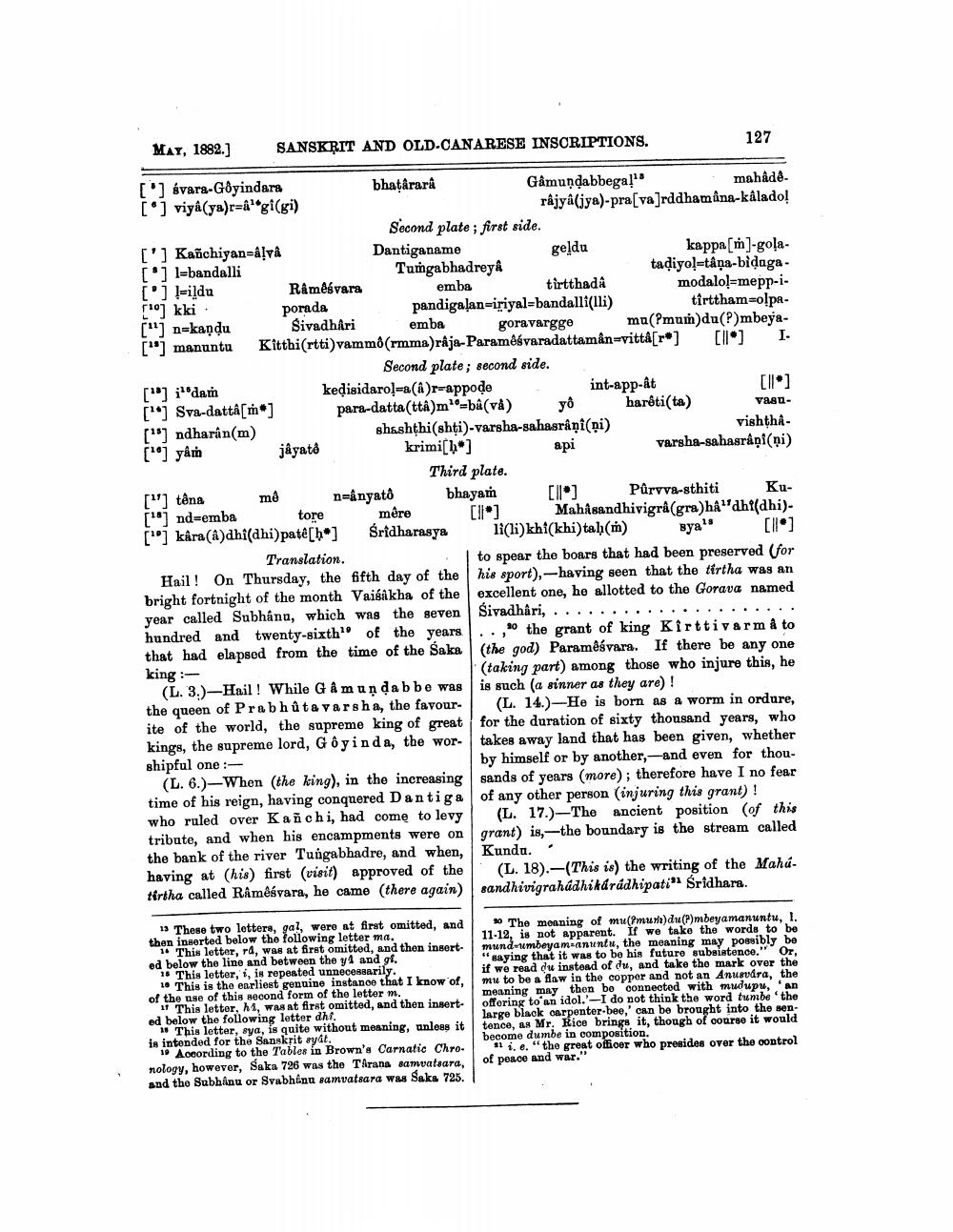________________
MAY, 1882.)
SANSKRIT AND OLD-CANARESE INSCRIPTIONS.
127
['] svara-Gôyindara
bhatârara Gâmundabbega!"
mahade[] viya(ya)r=&?*gi(gi)
râjyâ(jya)-pra[va]rddhamâna-kâlado!
Second plate ; first side. ['] Kanchiyan=&!vå
Dantiganame
geldu
kappa[m]-gola['] lubandalli Tumgabhadreya
tadiyo!=tâņa-bidaga - ['] !=ildu Rámêsvara
emba tirtthada
modalo!=mepp-i. [1] kki porada pandigalan-iriyal-bandalli(lli)
tîrtthamrolpa["] n=kaņdu Sivadhâri emba goravargge m a(Pmum du(?)mbeya["] manuntu Kitthi(rtti)vammô(rmma)rája-Paramêśvaradattamân=vittå[r*] [IS] I.
Second plate ; second side. ["] i da kedisidaro!=a(a)r=appode
int-app-at
[ll] [^] Sva-dattâ[mo] para-datta(tt)mo=bâ(vá) y barêti(ta) Vasu["] ndharan(m) Bhashthi(shti)-varsha-sahasrani(ni)
vishth[:] yêu
jấyatê krimi[1]
арі
varsha-sahasråņi(ni)
Third plate. ["] têna mê
n=ânyatô bhayam [lo] Púryva-sthiti Ku[18] nd=emba t ore mêre [P] Mahasandhivigrâ(gra)ha" dht(dhi)[""] kara(a)dhi(dhi)pate[ho] Sridharasya i(li) khi(khi) tah() sya"* [ll] Translation.
to spear the boars that had been preserved (for Hail ! On Thursday, the fifth day of the his sport), --having seen that the tirtha was an bright fortnight of the month Vaisakha of the excellent one, he allotted to the Gorava named year called Subhana, which was the seven Sivadhâri, ..................... hundred and twenty-sixth of the years 1 . ., the grant of king Kirttivarm å to that had elapsed from the time of the Saka (the god) Paramêsvara. If there be any one king:
(taking part) among those who injure this, he (L. 3.)-Hail! While Gâmundabbe was is such (a sinner as they are)! the queen of Prabhûta varsha, the favour (L. 14.)-He is born as a worm in ordure, ite of the world, the supreme king of great for the duration of sixty thousand years, who kings, the supreme lord, Gôyinda, the wor- takes away land that has been given, whether shipful one :
by himself or by another,--and even for thou(L. 6.)-When the king), in the increasing sands of years (more); therefore have I no fear time of his reign, having conquered Dantiga of any other person (injuring this grant)! who ruled over Kanchi, had come to levy (L. 17.)-The ancient position (of this tribute, and when his encampments were on grant) is,-the boundary is the stream called the bank of the river Tungabhadre, and when, Kundu.. having at (his first (visit) approved of the (L. 18).-(This is) the writing of the Mahutirtha called RÂmêsvara, he came (there again) sandhivigrahadhikáradhipati Sridhara.
> These two letters, gal, were at first omitted, and then inserted below the following letter ma.
1. This letter, rd, was at first omitted, and then insert ed below the line and between the yi and gf.
15 This letter, i, is repeated unnecessarily.
16 This is the earliest genuine instance that I know of. of the use of this second form of the letter m.
11 This letter, h1, was at first omitted, and then insert ed below the following letter dhi.
# This letter, sya, is quite without meaning, unless it is intended for the Sanskrit ayat.
19 According to the Tables in Brown's Carnatic Chro. nology, however, Saka 726 was the Tarana samvatsara, and the Subhanu or Svabhenu samvatsara was Saka 725.
The meaning of mumuri) du (P)mbeyamanuntu, I. 11-12, is not apparent. If we take the words to be mund-mbeyam-anuntu, the meaning may possibly bo "saying that it was to be his future subsistence. Or, if we read du instead of du, and take the mark over the mu to be a flow in the copper and not an Anusvára, the meaning may then bo oonnected with mudupu. 'an offering to an idol. I do not think the word tunibe the large black carpenter-bee,' can be brought into the sentence, as Mr. Rice brings it, though of course it would become dumbe in composition.
11 i.e. "the great officer who presides over the control of peace and war."




